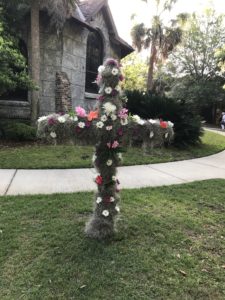
The last two Sundays, Palm Sunday and Easter, Wesley UMC offered us an annotated bulletin. Bulletins are paper sheets or folders that allow you to follow the order of worship. The annotated bulletin has a column to the side that explains the various parts of worship to people who are unfamiliar with the service. At least, explanation is their intent.
The annotated bulletin we got at Wesley did not fulfill its purpose. If you were someone who had never been to church before, you would not have found the annotations helpful. The notes were as full of “churchy” language as the bulletin itself. For instance, here is the note on the Gloria Patri. “Gloria Patri means “Glory to the Father.” The Gloria Patri is a Trinitarian hymn of praise or a doxology.” If I don’t know what “Gloria Patri” means, I’m not going to understand “Trinitarian” or “doxology.”
When we grow up in church, we often use “churchy” language. As a pastor, I tried to be particularly aware of this. I might call it the “narthex” or “nave,” but would you know where to put the candles if that’s where I tell you to go? If we want to make Christianity inviting and accessible to people who are not Christians, we have to use language they understand.
When we are trying to explain Christianity what language do we use? Do we tell people they need salvation because of sin in their lives? That may sound simple to us but what do “salvation” and “sin” mean if you have never heard those terms before?
What should an annotated bulletin for Easter sound like? Try this: Jesus was a popular teacher and leader. He attracted a loyal group of followers. Those closest to him thought he was the Son of God. But the government leaders arrested him and killed him. Imagine the grief and disappointment of those who believed in him. Everything they hoped for destroyed. It was worse than being a Hillary Clinton supporter the day after the election.
Three days after Jesus died, some of the women who still believed he was the Son of God went to the place where he was buried. When they got there, they found the grave was empty. Jesus appeared to them and told them he was, indeed, the Son of God. Imagine how the women felt. They were sure Jesus, their teacher was dead, but now they see him alive. He told them not to be afraid, but to tell everyone. On Easter we celebrate because Jesus is the Son of God and he is alive. If we believe this, Jesus promises that we will be able to live forever with him.
Jesus wants all of us to tell others that he is the Son of God and he is alive. In order to do so, we have to use language that people can understand. What words will you use to tell someone about Jesus? How will you share the good news that Jesus, the Son of God, is alive in your life? What is your annotated bulletin about Jesus?

Thank you Pastor Karen – great article!
Thanks for reading, Ella! Hope you had a wonderful Easter.